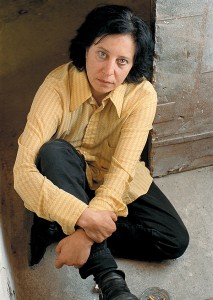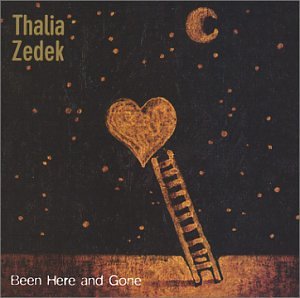 FOREWORD: I always had utmost respect for Thalia Zedek, former leader of caliginous Boston combo, Come. And I’ve met her on several occasions. There were Maxwells shows fronting Come and backing Steve Wynn and a few interviews between. She went solo when I conducted the following interview in ’01. Since then, she’s released ‘04s wordily scrabbled Trust Not Those In Whom Without Some Touch Of Madness and ‘08s better Liars And Prayers. This article originally appeared in Aquarian Weekly.
FOREWORD: I always had utmost respect for Thalia Zedek, former leader of caliginous Boston combo, Come. And I’ve met her on several occasions. There were Maxwells shows fronting Come and backing Steve Wynn and a few interviews between. She went solo when I conducted the following interview in ’01. Since then, she’s released ‘04s wordily scrabbled Trust Not Those In Whom Without Some Touch Of Madness and ‘08s better Liars And Prayers. This article originally appeared in Aquarian Weekly.
After four dark-hued, long-playing diamonds in the rough as leader of Boston band Come, Thalia Zedek assembled a few talented local friends for her haunting solo debut. Another hard luck, despair-ridden psychotic journey into the dank duskiness of a desolate, whiskey-soaked urban evening, Been Here And Gone invokes seamy, archival folk mysteries without getting over-indulgent.
Whether intentional or not, Zedek’s gravelly, cigarette-stained opening salvo, ‘everybody knows’ (from the cryptic "Excommunications") quotes a song title from her mentor Leonard Cohen’s ‘80s comeback, I’m Your Man. That sense of hard-fought survival continues through the long distance sendoff "Strong" and the redemptive "Treacherous Thing" before drifting into Cohen’s own "Dance Me to the End of Love" (which spins into a circular gypsy waltz perfectly suited to beatnik troubadour Tom Waits).
Pianist Beth Heinberg (who’d played on Come’s Near Life Experience and Gently, Down The Stream) gives a stripped down cabaret-styled melancholia to the stormy moodiness of re-visited compositions "1926" and "Manha de Carnaval" while David Michael Curry’s plaintive viola provides an eerie beauty to several numbers. Perhaps only Bad Seed frontman Nick Cave and post-suicidal Marianne Faithfull could plunder into cracked romantic obsessions and broken-hearted premonitions with such fervor.
To add an ominous afterthought, Zedek took a bus to NYC on the day of the WTC attacks. Since there was no access to Manhattan and Brooklyn, she was left off at the 3rd Street Bridge and had to walk into the temporarily crippled Cultural Capitol of the World.
 I thought Been Here And Gone had a bleak literary darkness reminiscent of Tom Waits.
I thought Been Here And Gone had a bleak literary darkness reminiscent of Tom Waits.
THALIA ZEDEK: I took time off, did solo shows, and sang in different styles with different people. There’d be piano or viola accompaniment and we’d do covers. I started writing songs for those arrangements and there was more room for vocals and melodies rather than guitar riffs. That was hard to do with Come. We had quiet stuff, but I had a better chance to do more with that. I wasn’t listening to Tom Waits, but instead, quieter stuff like Chet Baker.
This album fits in well with low key fare by Spain and Low. Your cover of "1926" reminded me of the somber album Patti Smith did after the death of her husband, Fred ‘Sonic’ Smith in the mid-’90s.
THALIA: Yeah... Gary Gogel wrote "1926." He’s from Boston and had an early ‘80s band, Vee, that put out a 4-song EP before breaking up. Their singer was Susan Anway, who was the first Magnetic Fields singer. They were great. I always loved that song. I sent Gary a copy of my cover.
It fits in well tucked next to Leonard Cohen’s "Dance Me to the End of Love."
THALIA: I had never heard his original studio recording on Various Positions until after we made the record. But I took it from a live arrangement he did on a European tour.
On "Temporary Guest," David Curry’s viola arrangement reminded me of the work Jane Scarpantoni did on Dylan’s Desire.
THALIA: David Michael Curry is a guy from Boston I’ve been playing with. He’s now on tour in Europe with Boxhead Ensemble. He’s done stuff with Will Oldham. I play clarinet in his band Empty House Co-Operative, an improvisational group. He also plays full time in Willard Grant Conspiracy. He’s a good friend who’s extremely talented. He plays trumpet, viola, and guitar.
Who’s Louise Banfa, the composer of "Manha De Carnaval"?
THALIA: That was written a long time ago for this Brazilian movie, Black Orpheus. It came out around 1958. It’s a well-known song Frank Sinatra, Tony Bennett, and many Latin singers covered. It’s a Latin standard. Beth is usually an accompanist so she had the sheet music. I said, "Why don’t you pick a new cover." Then, we discovered how popular it was.
The orchestral departure, "De-Sanctified," is quite a turnabout for yo
FOREWORD: I always had utmost respect for Thalia Zedek, former leader of caliginous Boston combo, Come. And I’ve met her on several occasions. There were Maxwells shows fronting Come and backing Steve Wynn and a few interviews between. She went solo when I conducted the following interview in ’01. Since then, she’s released ‘04s wordily scrabbled Trust Not Those In Whom Without Some Touch Of Madness and ‘08s better Liars And Prayers. This article originally appeared in Aquarian Weekly.
 I thought Been Here And Gone had a bleak literary darkness reminiscent of Tom Waits.
THALIA ZEDEK: I took time off, did solo shows, and sang in different styles with different people. There’d be piano or viola accompaniment and we’d do covers. I started writing songs for those arrangements and there was more room for vocals and melodies rather than guitar riffs. That was hard to do with Come. We had quiet stuff, but I had a better chance to do more with that. I wasn’t listening to Tom Waits, but instead, quieter stuff like Chet Baker.
This album fits in well with low key fare by Spain and Low. Your cover of "1926" reminded me of the somber album Patti Smith did after the death of her husband, Fred ‘Sonic’ Smith in the mid-’90s.
THALIA: Yeah... Gary Gogel wrote "1926." He’s from Boston and had an early ‘80s band, Vee, that put out a 4-song EP before breaking up. Their singer was Susan Anway, who was the first Magnetic Fields singer. They were great. I always loved that song. I sent Gary a copy of my cover.
It fits in well tucked next to Leonard Cohen’s "Dance Me to the End of Love."
THALIA: I had never heard his original studio recording on Various Positions until after we made the record. But I took it from a live arrangement he did on a European tour.
On "Temporary Guest," David Curry’s viola arrangement reminded me of the work Jane Scarpantoni did on Dylan’s Desire.
THALIA: David Michael Curry is a guy from Boston I’ve been playing with. He’s now on tour in Europe with Boxhead Ensemble. He’s done stuff with Will Oldham. I play clarinet in his band Empty House Co-Operative, an improvisational group. He also plays full time in Willard Grant Conspiracy. He’s a good friend who’s extremely talented. He plays trumpet, viola, and guitar.
Who’s Louise Banfa, the composer of "Manha De Carnaval"?
THALIA: That was written a long time ago for this Brazilian movie, Black Orpheus. It came out around 1958. It’s a well-known song Frank Sinatra, Tony Bennett, and many Latin singers covered. It’s a Latin standard. Beth is usually an accompanist so she had the sheet music. I said, "Why don’t you pick a new cover." Then, we discovered how popular it was.
The orchestral departure, "De-Sanctified," is quite a turnabout for yo
I thought Been Here And Gone had a bleak literary darkness reminiscent of Tom Waits.
THALIA ZEDEK: I took time off, did solo shows, and sang in different styles with different people. There’d be piano or viola accompaniment and we’d do covers. I started writing songs for those arrangements and there was more room for vocals and melodies rather than guitar riffs. That was hard to do with Come. We had quiet stuff, but I had a better chance to do more with that. I wasn’t listening to Tom Waits, but instead, quieter stuff like Chet Baker.
This album fits in well with low key fare by Spain and Low. Your cover of "1926" reminded me of the somber album Patti Smith did after the death of her husband, Fred ‘Sonic’ Smith in the mid-’90s.
THALIA: Yeah... Gary Gogel wrote "1926." He’s from Boston and had an early ‘80s band, Vee, that put out a 4-song EP before breaking up. Their singer was Susan Anway, who was the first Magnetic Fields singer. They were great. I always loved that song. I sent Gary a copy of my cover.
It fits in well tucked next to Leonard Cohen’s "Dance Me to the End of Love."
THALIA: I had never heard his original studio recording on Various Positions until after we made the record. But I took it from a live arrangement he did on a European tour.
On "Temporary Guest," David Curry’s viola arrangement reminded me of the work Jane Scarpantoni did on Dylan’s Desire.
THALIA: David Michael Curry is a guy from Boston I’ve been playing with. He’s now on tour in Europe with Boxhead Ensemble. He’s done stuff with Will Oldham. I play clarinet in his band Empty House Co-Operative, an improvisational group. He also plays full time in Willard Grant Conspiracy. He’s a good friend who’s extremely talented. He plays trumpet, viola, and guitar.
Who’s Louise Banfa, the composer of "Manha De Carnaval"?
THALIA: That was written a long time ago for this Brazilian movie, Black Orpheus. It came out around 1958. It’s a well-known song Frank Sinatra, Tony Bennett, and many Latin singers covered. It’s a Latin standard. Beth is usually an accompanist so she had the sheet music. I said, "Why don’t you pick a new cover." Then, we discovered how popular it was.
The orchestral departure, "De-Sanctified," is quite a turnabout for yo